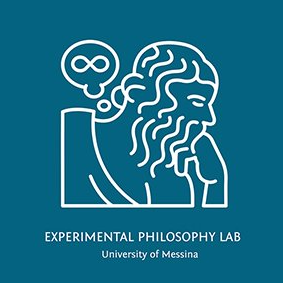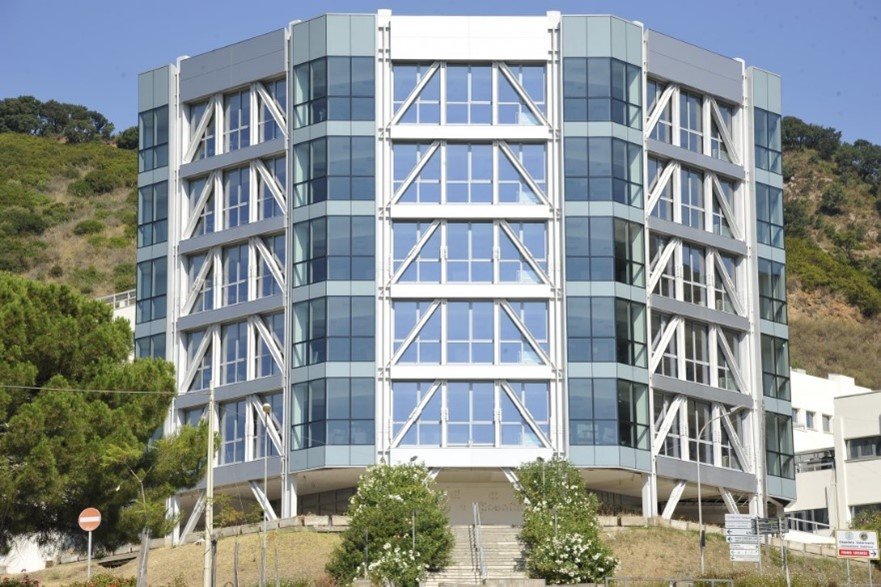
What is the Experimental Philosophy?
Experimental Philosophy is a field of study that combines the traditional theoretical approach of Philosophy with the methodology of social sciences and experimental disciplines such as psychology and psychobiology. The goal of Experimental Philosophy is to address classical philosophical problems not only on a speculative level but also with the help of experimental data. In this way, the Lab offers a significant learning opportunity for Philosophy students, enabling them to acquire skills related to experimental research methodology and statistical data analysis.
The Experimental Philosophy Lab of the Messina University
The Experimental Philosophy Lab at the DiCAM Department was founded in 2023 by Professor Valentina Cuccio, who serves as its scientific director. The Lab's purpose is to conduct experimental work that primarily, but not exclusively, focuses on the embodiment of language, pragmatics and figurative language, and the social dimension of the mind. The Lab is equipped with a station that allows for the creation of experiments involving the measurement of behavioral indices and/or the recording of physiological parameters. The lab is part of the XPRAG.it network, the Italian Experimental Pragmatics Network, and the Interuniversity Research Center on Metaphors (CIRM). It boasts several collaborations with other research centers in Italy (e.g., the Neuroscience Department of Parma) and abroad (e.g., the Metaphor Lab at the University of Amsterdam). Besides research activities, the Lab organizes an annual seminar series featuring nationally and internationally renowned philosophers and neuroscientists.
Head of the Lab
Lab’s members
Research lines
- Epistemic Injustice
- Metaphor
- Abstract concepts
- Negation
- Social cognition and vitality forms
Funded progects
- Metaphor and Epistemic Injustice in Mental Illness: the case of Schizophrenia. Funded under the PRIN2022_PNRR call.
-The neuroscience of translation. Novel and dead metaphor processing in native and second-language speakers. Funded by Imminent. Translated Research Center
- Garello, S., Ferroni F., Gallese, V., Ardizzi, M., Cuccio, V. (2024), “The Role of Embodied Cognition in Action Language Comprehension in L1 and L2”, Scientific Reports.
- Garello, S., Ferroni F., Gallese, V., Ardizzi, M., Cuccio, V. (2024), “From Breaking Bread to Breaking Hearts: Embodied Simulation and Action Language Comprehension”, Language, Cognition and Neuroscience, DOI: https://doi.org/10.1080/23273798.2024.2328596.
- Montalti, M., Calbi, M., Umiltà M.A., Gallese, V., Cuccio, V. (2024), “The role of motor inhibition in implicit negation processing: two Go/No-Go behavioral studies”, Psychological Research, DOI: https://doi.org/10.1007/s00426-024-01941-0.
- Cuccio, V. (2022), “Pragmatica ed Embodiment”, in Valentina Bambini and Filippo Domaneschi (a cura di), Pragmatica sperimentale, Il Mulino.
- Cuccio, V. Caruana, F. (2022), “Motor simulation of facial expressions, but not emotional mirroring, depends on automatic sensorimotor abduction”, in Lorenzo Magnani (Ed.), Handbook of Abductive Cognition, Springer.
- Cuccio, V. Di Stasio, G., Fontana, S. (2022), “On the embodiment of negation in Italian sign language (LIS): An approach based on Multiple representation theories”, Frontiers in Psychology, doi: 10.3389/fpsyg.2022.811795
- Cuccio V., Perconti P., Steen G., Shtyrov Y., Huang Y. (2022), “Experimental approaches to Pragmatics”, Frontiers in Psychology, doi: https://doi.org/10.3389/fpsyg.2022.865737
- Cuccio, V. (2022), “The figurative brain”. In A. Garcia e A. Ibanez, (Eds). Routledge Handbook of Neurosemiotics, Routledge.
- Cuccio, V., Graziano, M. (2022). “A two-level model of embodied mathematical thinking. Body schema, body image and language”. In Shyam Wuppuluri, A. C. Grayling (Eds.), Metaphors and Analogies in Sciences and Humanities: Words and Worlds, Synthese library series, Springer.
- Di Cesare, G., Cuccio, V., Marchi, M., Sciutti, A.,Rizzolatti, G., (2021), “Communicative And Affective Components in Processing Auditory Vitality Forms: An fMRI Study”, Cerebral Cortex, 2021, bhab255, https://doi.org/10.1093/cercor/bhab255
- Castano, E., Paladino. M.P., Cadwell, O., Cuccio, V., Perconti, P. (2021). “Exposure to Literary Fiction is Associated with Lower Psychological Essentialism”, Frontiers in Psychology, Vol. 12. Pages: 2152. doi: 10.3389/fpsyg.2021.662940
- Montalti, M., Calbi, M., Cuccio, V., Umiltà, M.A., Gallese, V. (2021), “Is motor inhibition involved in the processing of sentential negation? An assessment via the Stop Signal Task”, Psychological Research. 10.1007/s00426-021-01512-7.
- Cuccio, V., Wilkinson, E., Garcia, B., Schembri, A. Fontana, S. (2020), “Sign Language Research Sixty Years Later: Current and Future Perspectives”, Frontiers in Psychology.
- Cuccio V., Caruana F. (2019), “Rethinking the abstract/concrete concepts dichotomy. Comment on “Words as social tools: Language, sociality and inner grounding in abstract concepts” by Anna M. Borghi et al.”, Physics of Life Reviews, Vol. 29, P. 157-160. doi:https://doi.org/10.1016/j.plrev.2019.04.007. ISSN:1571-0645.
- Cuccio V., Steen G. (2019), “Deliberate Metaphors and Embodied Simulation”, in Ignasi Navarro (Ed.), Current approaches to Metaphor Analysis in Discourse, Berlin: De Gruyter Mouton. Chapter doi:10.1515/9783110629460-009.
- Cuccio V. (2018). Attention to Metaphor. From neurons to representations. Amsterdam: John Benjamins Publishing Company. ISBN 9789027202116.
- Cuccio V., Gallese V. (2018), “A Peircean account of concepts. Grounding abstraction in phylogeny through a comparative neuroscientific perspective”, Philosophical Transactions of the Royal Society B, vol. 373. doi: http://dx.doi.org/10.1098/rstb.2017.0128. ISSN (Online): 14-71-2970. ISSN (print 0962-8436).
- Gallese V., Cuccio V. (2018), “The neural exploitation hypothesis and its implications for an embodied approach to language and cognition: Insights from the study of action verbs processing and motor disorders in Parkinson’s Disease”, Cortex, volume 100, p. 215-225. ISSN: 0010-9452.
- Carapezza M., Cuccio V. (2018), “Abductive inferences in pragmatic processes”, in Capone A., Carapezza M., Lo Piparo (eds.), Further Advances in Pragmatics and Philosophy, Perspectives in Pragmatics, Philosophy & Psychology, vol 18, Cham: Springer. ISBN 978-3-319-72172-9, 457594_1_En, (11).
- Di Cesare G., Errante A., Marchi M., Cuccio V. (2017), “Language for action: Motor resonance during the processing of human and robotic voices”, Brain and Cognition, n.118, p. 118-127. doi: http://dx.doi.org/10.1016/j.bandc.2017.08.001. ISSN: 0278-2626.
- Cuccio V., Fontana S. (2017), “Embodied Simulation and Metaphorical Gestures”, in F. Ervas, E. Gola, M.G. Rossi (eds.), Metaphor in Communication, Science, and Education, p. 77-91, Berlin: De Gruyter Mouton. ISBN 978-3-11-054748-1.
- Caruana F., Cuccio V. (2017). “Overcoming the acting/reasoning dualism in intelligent behaviour”, Phenomenology and the Cognitive Sciences, Springer, Volume 16, Issue 4, pp 709–713. doi:10.1007/s11097-016-9471-1. ISSN: 1568-7759 (print version), ISSN:1572-8676 (electronic version).
- Caruana, F., Cuccio, V. (2017). Types of abduction in tool behaviour. Phenomenology and the Cognitive Sciences, Springer, Volume 16, Issue2, pp 255–273. DOI 10.1007/s11097-015-9450-y. ISSN: 1568-7759 (print version), ISSN:1572-8676 (electronic version).
- Cuccio V. (2017), Body-schema and body-image in metaphor processing, in B. Hampe (a cura di), Metaphor: From Embodied Cognition to Discourse, Cambridge University Press. ISBN:9781107198333
- Gallese V., Cuccio V. (2016), “The paradigmatic body. Embodied simulation, intersubjectivity and the bodily self”. T. Metzinger & J. Windt (eds.), Open MIND, The MIT Press, Cambridge, Massachussets. ISBN:9780262034609.
- Cuccio V., AMBROSECCHIA M., Ferri F., CARAPEZZA M., LO PIPARO F., FOGASSI L., GALLESE V. (2014), “How the context matters. Literal and figurative meaning in the embodied language paradigm”. PlosOne, 9(12) e115381. doi: 10.1371/journal.pone.0115381. ECollection
- Cuccio V., Carapoezza, M. (2013), “Is Displacement Possible without Language?
- Evidence from Preverbal Infants”, Philosophical Psychology. ISSN 0951-5089 (Print), 1465-394X (Online). Taylor & Francis.
The Experimental Philosophy Lab at the University of Messina is committed to conducting its research while adhering to the highest ethical standards, in compliance with the 2013 Declaration of Helsinki and the APA Ethical Guidelines for Research.
We recognize the importance of treating all participants in our studies with respect and dignity, ensuring they are clearly and transparently informed about the purposes, procedures, and potential implications of the research they are participating in. Participants will be given all necessary information, particularly regarding the procedures used, before the research begins. Participation will then be contingent upon signing the informed consent form. Additionally, as participation in the studies is voluntary, participants will be informed of their freedom to withdraw from the research at any time without providing any explanation. All our research projects undergo review by an Ethics Committee before conducting the research, which evaluates their compliance with international ethical regulations and guidelines.
Furthermore, we are committed to maintaining the confidentiality and privacy of the data collected, ensuring that it is used exclusively for research purposes and protected from unauthorized access in accordance with data protection laws (GDPR). Additionally, the research results will be analyzed and published in an anonymous and aggregated form, solely for research purposes, ensuring the privacy of the participants involved. All lab members, as well as any students and collaborators, are trained in ethical practices and responsible research management, promoting a work environment based on scientific integrity and mutual respect.

The Experimental Philosophy Lab at the University of Messina is always looking for new collaborators to expand its research activities and build a network of scholars interested in the intersection between philosophy and experimental sciences.
If you are a researcher, you can collaborate with us by participating in our studies, proposing new research projects, and co-publishing with us in international journals.
If you are a student, you will have the opportunity to participate in internships, experimental thesis projects, and lab activities, gaining practical skills in research methodology and data analysis. Students will be involved in every phase of the research, including the design, preparation, administration, and discussion of experimental work. A designated tutor will always be present to help the students learn and achieve autonomy with the appropriate training.
If you are not a researcher or a student but are interested in Experimental Philosophy, understanding how an Experimental Philosophy Lab works, or simply helping with the research, cContact us! We are always looking for participants for our studies.
Email: filosofiasperimentale@unime.it; Phone: 090-6762520
Prof. Valentina Cuccio: vcuccio@unime.it; Phone: 090-6765028
Department of Ancient and Modern Civilizations (DiCAM)
Viale Annunziata, 98168, Messina, Italy
